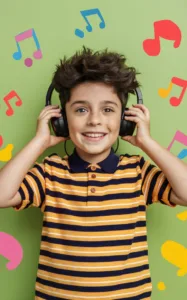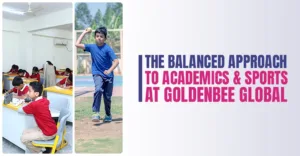
Music has been an integral part of human culture for centuries, serving as a source of entertainment, expression, and connection. But beyond its cultural significance, music plays a crucial role in child development. From boosting cognitive skills to enhancing social and emotional growth, the impact of music on young minds is profound and multifaceted. This blog explores the various ways music contributes to child development and provides insights on how parents and educators can harness its benefits.
Cognitive Development
1. Enhances Memory and Learning
Music can significantly improve a child’s memory and learning abilities. Songs with repetitive lyrics and melodies help children remember information more effectively. This is why many educational tools incorporate music to teach numbers, alphabets, and other foundational concepts.
2. Improves Language Skills
Listening to and singing along with music can enhance a child’s vocabulary and language skills. Music introduces children to new words and phrases, helping them understand language structure and improve their pronunciation.
3. Boosts Spatial-Temporal Skills
Studies have shown that children who engage in music education tend to perform better in spatial-temporal tasks, which are crucial for problem-solving and critical thinking. These skills are particularly beneficial in subjects like mathematics and science.
Emotional Development
1. Expressing Emotions
Music provides a safe and creative outlet for children to express their emotions. Through music, children can explore and convey feelings that they might find difficult to articulate through words alone.
2. Reduces Stress and Anxiety
Listening to calming music can help reduce stress and anxiety in children. Music therapy is often used to help children cope with emotional challenges, providing a sense of comfort and security.
3. Enhances Empathy and Understanding
Through music, children can experience and understand different emotions, which can enhance their empathy and social understanding. Songs with stories and characters can help children see the world from different perspectives.
Social Development
1. Fostering Social Interaction
Participating in musical activities, such as singing in a choir or playing in a band, encourages children to work collaboratively and develop teamwork skills. These activities also provide opportunities for social interaction and friendship building.
2. Improving Communication Skills
Music encourages children to listen actively and respond to auditory cues, which can improve their overall communication skills. Engaging in group music activities also helps children learn to take turns, follow directions, and cooperate with others.
3. Building Confidence and Self-Esteem
Performing music in front of an audience, whether it’s family, friends, or a larger group, can significantly boost a child’s confidence and self-esteem. The sense of accomplishment and recognition they receive reinforces their self-worth.
Physical Development
1. Enhancing Motor Skills
Playing musical instruments and engaging in rhythmic activities can improve a child’s fine and gross motor skills. For example, playing the piano or guitar requires precise finger movements, while dancing to music improves coordination and balance.
2. Encouraging Physical Activity
Music naturally encourages movement and physical activity. Children are often inclined to dance, jump, and clap along to their favorite tunes, promoting physical fitness and healthy habits.
Practical Tips for Parents and Educators
1. Introduce Music Early
Expose children to music from an early age. Play a variety of music genres and encourage them to sing along, clap, or move to the rhythm.
2. Incorporate Music into Daily Routines
Integrate music into daily routines to make activities more enjoyable. For example, play upbeat music during playtime or calming tunes during bedtime.
3. Encourage Participation in Music Activities
Enroll children in music classes, such as singing lessons, instrument classes, or dance groups. Participating in these activities can foster their musical talents and social skills.
4. Use Music as an Educational Tool
Utilize music as a tool for learning. Educational songs can make subjects like math, science, and language more engaging and memorable for children.
Conclusion
Music is a powerful tool that can significantly contribute to a child’s development across various domains. From cognitive and emotional growth to social and physical benefits, the impact of music on young minds is undeniable. By incorporating music into their daily lives, parents and educators can help children develop essential skills and foster a lifelong love for music.
Embrace the power of music and watch as it enriches your child’s development, making learning and growth a harmonious journey.
By integrating these insights into your child’s routine, you can create a nurturing environment that leverages the benefits of music for comprehensive development. For more learning visit us.







